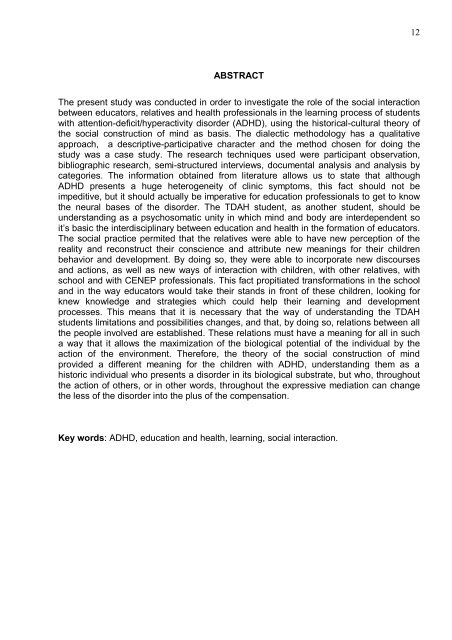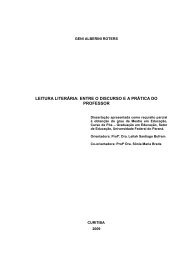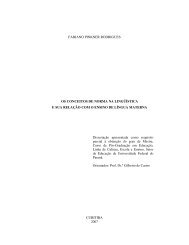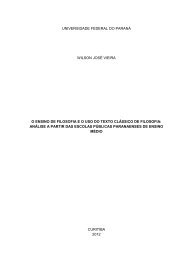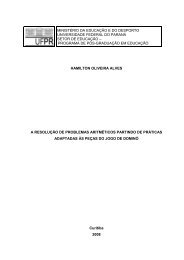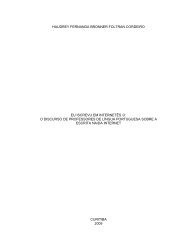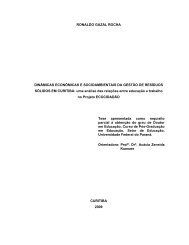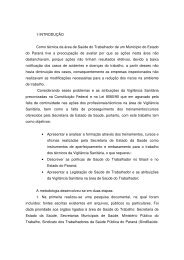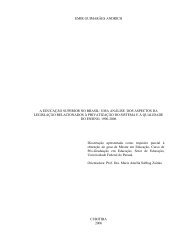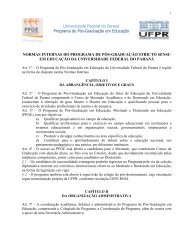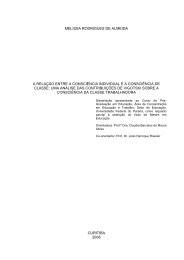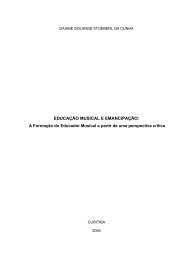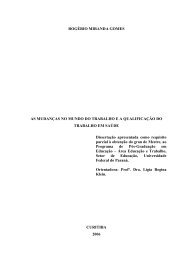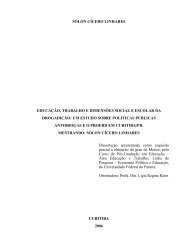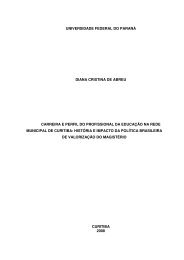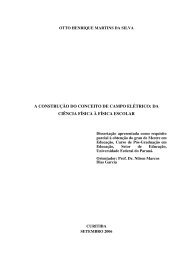Sandra Regina Dias de Costa - Programa de Pós-Graduação em ...
Sandra Regina Dias de Costa - Programa de Pós-Graduação em ...
Sandra Regina Dias de Costa - Programa de Pós-Graduação em ...
You also want an ePaper? Increase the reach of your titles
YUMPU automatically turns print PDFs into web optimized ePapers that Google loves.
12<br />
ABSTRACT<br />
The present study was conducted in or<strong>de</strong>r to investigate the role of the social interaction<br />
between educators, relatives and health professionals in the learning process of stu<strong>de</strong>nts<br />
with attention-<strong>de</strong>ficit/hyperactivity disor<strong>de</strong>r (ADHD), using the historical-cultural theory of<br />
the social construction of mind as basis. The dialectic methodology has a qualitative<br />
approach, a <strong>de</strong>scriptive-participative character and the method chosen for doing the<br />
study was a case study. The research techniques used were participant observation,<br />
bibliographic research, s<strong>em</strong>i-structured interviews, documental analysis and analysis by<br />
categories. The information obtained from literature allows us to state that although<br />
ADHD presents a huge heterogeneity of clinic symptoms, this fact should not be<br />
impeditive, but it should actually be imperative for education professionals to get to know<br />
the neural bases of the disor<strong>de</strong>r. The TDAH stu<strong>de</strong>nt, as another stu<strong>de</strong>nt, should be<br />
un<strong>de</strong>rstanding as a psychosomatic unity in which mind and body are inter<strong>de</strong>pen<strong>de</strong>nt so<br />
it’s basic the interdisciplinary between education and health in the formation of educators.<br />
The social practice permited that the relatives were able to have new perception of the<br />
reality and reconstruct their conscience and attribute new meanings for their children<br />
behavior and <strong>de</strong>velopment. By doing so, they were able to incorporate new discourses<br />
and actions, as well as new ways of interaction with children, with other relatives, with<br />
school and with CENEP professionals. This fact propitiated transformations in the school<br />
and in the way educators would take their stands in front of these children, looking for<br />
knew knowledge and strategies which could help their learning and <strong>de</strong>velopment<br />
processes. This means that it is necessary that the way of un<strong>de</strong>rstanding the TDAH<br />
stu<strong>de</strong>nts limitations and possibilities changes, and that, by doing so, relations between all<br />
the people involved are established. These relations must have a meaning for all in such<br />
a way that it allows the maximization of the biological potential of the individual by the<br />
action of the environment. Therefore, the theory of the social construction of mind<br />
provi<strong>de</strong>d a different meaning for the children with ADHD, un<strong>de</strong>rstanding th<strong>em</strong> as a<br />
historic individual who presents a disor<strong>de</strong>r in its biological substrate, but who, throughout<br />
the action of others, or in other words, throughout the expressive mediation can change<br />
the less of the disor<strong>de</strong>r into the plus of the compensation.<br />
Key words: ADHD, education and health, learning, social interaction.


